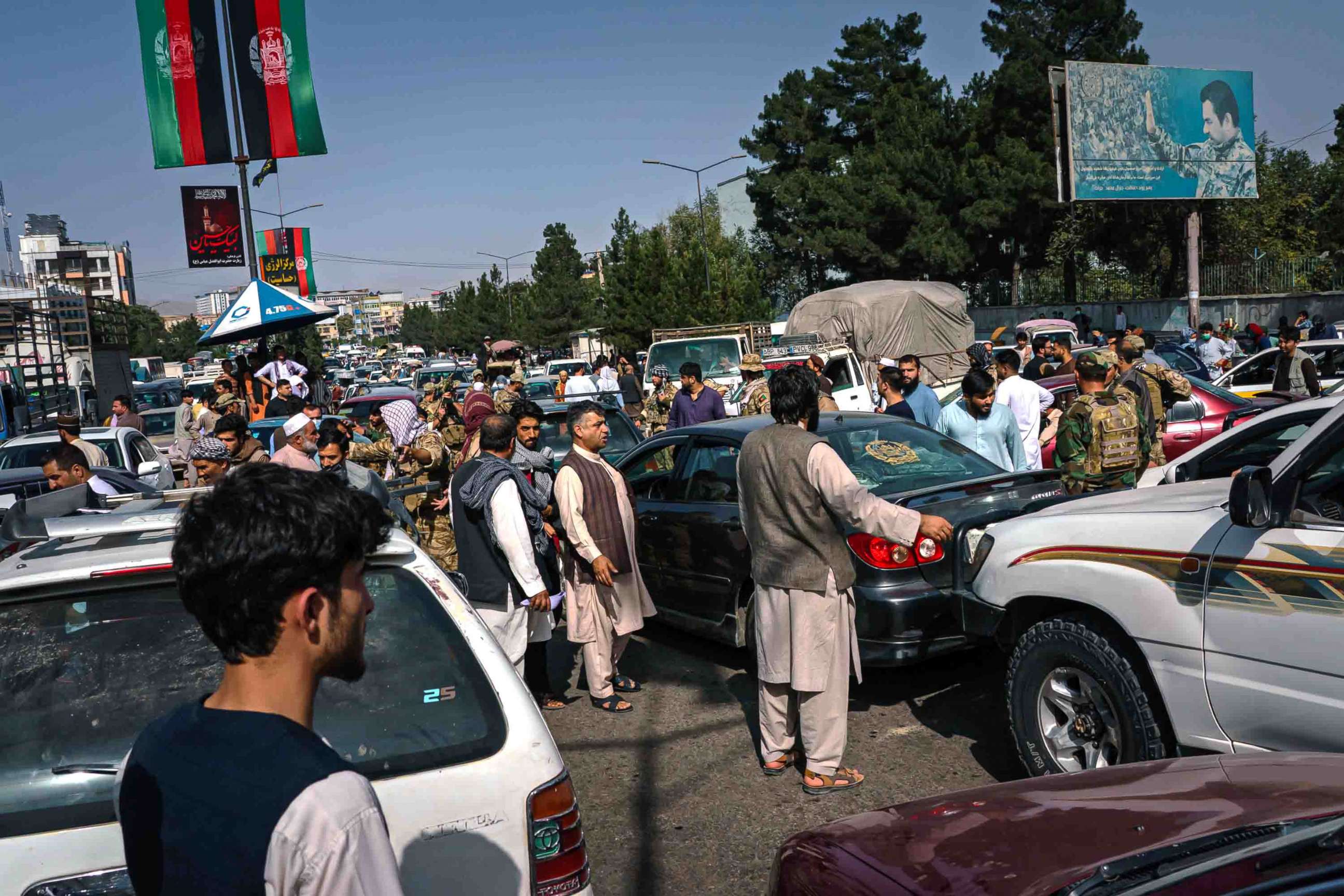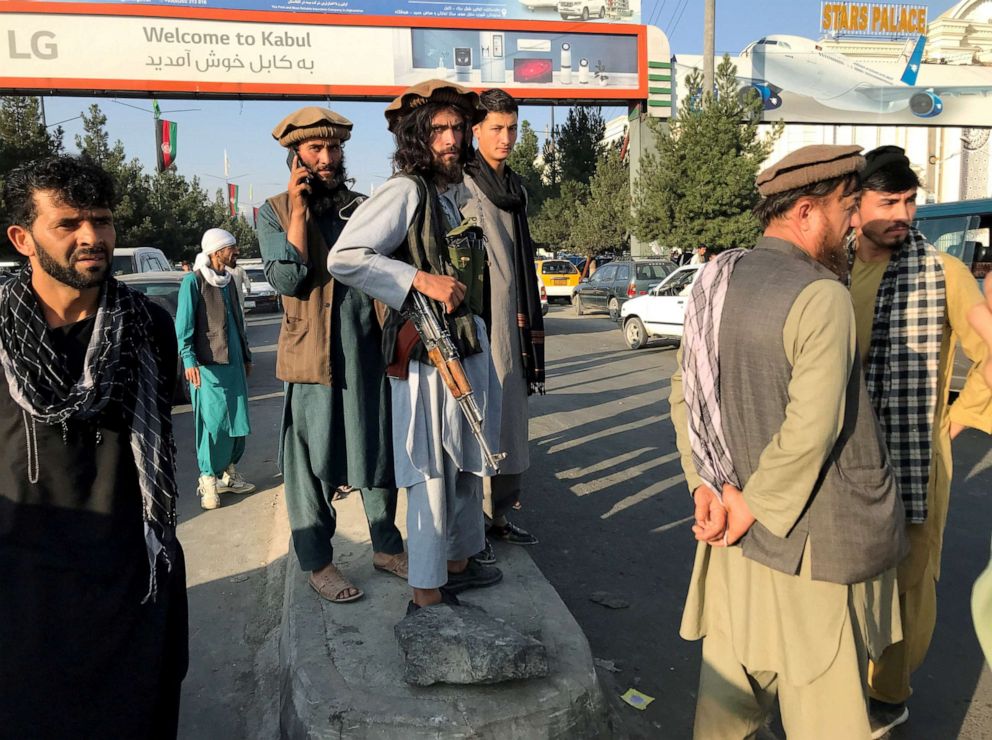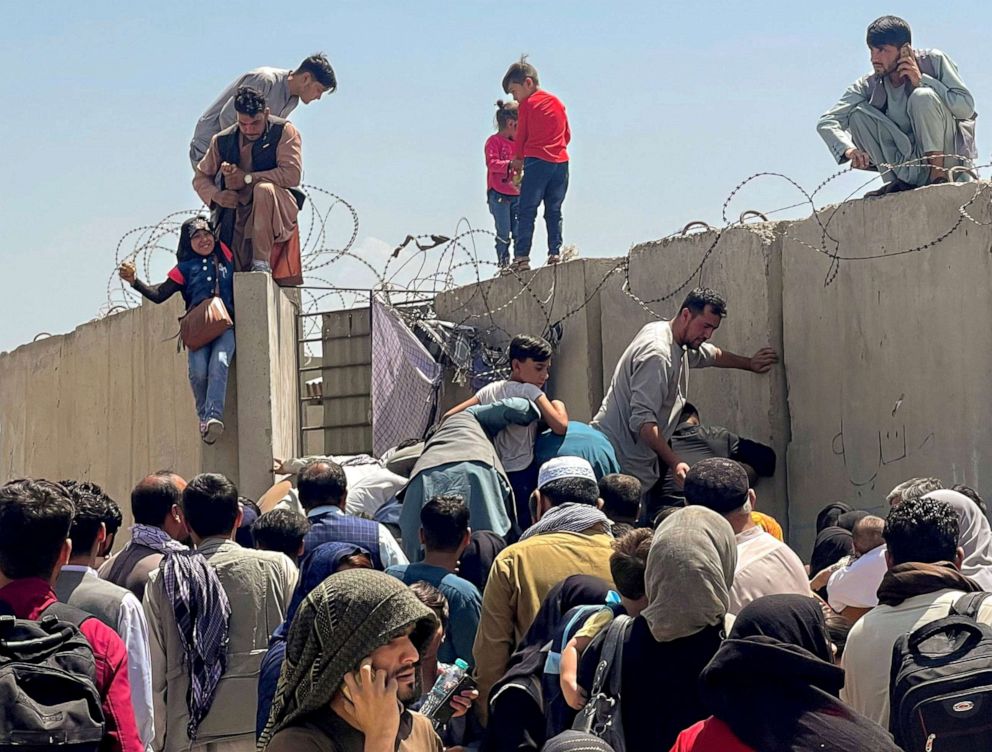Afghan contractor details his family's escape from Kabul
“We were expecting a peace… but right now, we went 20 years back,” he said.
Just 10 days ago, Ahmad and his family were living at home in Kabul, Afghanistan. Now, they’re starting a new life in the U.S.
“It's quite different and I like it. It is something that I have never imagined before,” Ahmad told ABC News. In this report, he will only be referred to by his first name to protect his family.
“The peace. The calm... You're free, you can go anywhere, you can do anything, you enjoy your life. And the most important thing [is] that we have a better future for children.”

Within a few short weeks of American troops’ departure, Ahmad’s home country of Afghanistan fell quickly to the Taliban, an Islamic military insurgent group. This catastrophic outcome came after 20 years of American forces fighting there and almost a trillion dollars spent. Nearly 2,400 Americans, 66,000 Afghan military fighters and over 47,000 Afghan civilians were killed in the decadeslong war.
“I just missed… what's happening in Afghanistan. This week, I came here, and then next Friday. It was under the Taliban control,” he said. “I am very lucky, and I'm happy for that.”
Ahmad said it took him a year and a half to get out of the country, and now it’s “impossible” for the thousands of other Afghans trying to escape.
For years, Ahmad worked in logistics, supplying equipment for the U.S. and Afghan forces in Kabul. But his association with the West made him a target for the Taliban, despite its assurances that those who worked with the U.S. would not be harmed.
“We don't believe them because … they recently killed some interpreters and journalists in our province, and put them in a massive mass grave,” Ahmad said. “They will do it again. They did it before and they are going to do it again.”
His special immigrant visa, or SIV, was finally approved this month, allowing him, his wife and their two daughters to get out.

“The situation in Afghanistan … for me, for my family, for my children, there was no future,” he said. “So that's why I decided to move.”
Still, most of their family is trapped back home and at risk. ABC News agreed not to reveal the family’s full name or where they are to avoid retribution against their relatives.
“God save them. And they should save themselves, they should hide themselves,” Ahmad said. “If [they] go out they will be caught on the, on the road, and [the Taliban will] put them in prison ... We can't say anything. I just told my friend ... Please change your locations, do not be in one place … don't be caught by the Taliban. Whatever you can do. Just don't be in your address, don't be in your home, or don't be in places that the people may find you. This is the only thing that I can tell my friends and coworkers in Afghanistan.”
Ahmad worries about the Taliban’s restrictions that will affect women in the country, including rules about not wearing nail polish and not being allowed in public without a male guardian.
“They are not allowed to go to the university or to school. So that means that, as is the same rule that they had in 1996 ... a woman is not allowed to go to the university or not to work,” he said. “So, basically, you have paralyzed, half of the community of the country, half of the population of the country, paralyzed.”
However, he believes women will “definitely” fight back for their freedoms.
“The women of Afghanistan today is not the women of Afghanistan before -- they are more educated,” he said. “They have seen the world, they know everything, and nobody will sit back and say okay, do whatever. Everybody will try to fight back, for their rights.”
Without the support and protection of the U.S. military, the success of women in the country seems hopeless.
Ahmad didn’t expect the war to end like this.

“We were expecting a peace in Afghanistan… a country that all the people should have their own rights, their own freedom, but right now, we went back. Twenty years back, the same spot that we were then,” he said. “It doesn't make me angry, but it makes me sad. As we know that America came for a purpose, they achieved their purpose. We cannot force them to stay in Afghanistan, and fight for, on, on our behalf.”
For Americans who served in the war, and for a generation of Afghans who saw the promise of progress, many are wondering if their sacrifices were in vain. Those left behind in the country may pay the highest cost as the situation grows direr by the minute.
Scenes from Kabul show thousands racing to flee at the airport, with adults and children hanging off aircraft as they attempt to take off. Six thousand American troops have now been ordered to head directly to Kabul to assist in the evacuation of U.S. personnel and Afghans who assisted the U.S. mission, a U.S. official told ABC News.
Ahmad decided to work for the U.S. in 2016.
“It was a good financial support for my family to live,” he said. “We thought that it is going to help our country with working with the U.S. government, and somehow we are helping our country to run the aircrafts, against the invaders.”
He didn’t know his work would make him a target of the Taliban.
“[In] the beginning, my neighbors, my relations, my close relatives … they were trying to convince me that I shouldn't work with U.S. government,” he said. Then, he said, he and his family were menaced with calls and knocks on their doors.
Ahmad says he believes Afghanistan’s rapid fall was a cause of its weak government.
“They didn't build [the government], then build their strength. They're all depending on the U.S. government support for U.S. military [for] 20 years, they [were] just relying on other forces. British or Australian forces. They didn't want to build their own ability or capability to control.”
He said he blames “ourselves” for his country’s downfall.
“Why we didn’t [we] change, and 20 years. We had everything, all the facilities, all the support, all the money, why we didn't change? Why we didn't change ourselves, why we didn't change for [the] better?” he said. “I blame ourselves, our leaders for that.”
He can’t foresee when he will return to his home country but says if the regime changes and if “There’s a peace, I will go back.”




